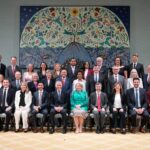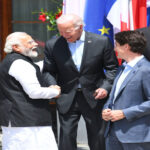The in-person meeting between Canadian Prime Minister Mark Carney and Indian Prime Minister Narendra Modi at the G7 Summit represents a significant gesture that marks the beginning of a crucial diplomatic process. The invitation from Prime Minister Carney alone, was particularly remarkable given that the Indo-Canadian relationship has been strained over the past two years due to serious allegations and political tensions.
The G7 Summit provided a neutral, multilateral forum where a face-to-face meeting could be politically justified and welcomed by both parties. This diplomatic opening, though modest, offers hope for the gradual repair of this important relationship between the two democracies.
The past two years have marked a particularly challenging period for Indo-Canadian relations. The crisis began following the murder of Hardeep Singh Nijjar, a Sikh separatist leader and Canadian national, in June 2023. Prime Minister Justin Trudeau subsequently made the extraordinary public accusation in the Canadian Parliament that the Indian government was involved in the murder. These allegations were vehemently denied by India, which dismissed them as “preposterous.” The diplomatic fallout from the Prime Minister’s allegations was severe. In a series of retaliatory moves, both countries expelled senior diplomats, effectively halting years of progress on trade negotiations.
Many observers viewed the recent Canadian election as an opportunity to heal the fractured relationship between Canada and India. Since then, both governments have made cautious outreach efforts. For example, Canada’s Foreign Affairs Minister, Anita Anand, recently held what was described as a constructive dialogue with India’s External Affairs Minister, S. Jaishankar—an exchange that marked a step toward renewed diplomatic engagement. Prime Minister Carney’s invitation to Prime Minister Modi reflects broader strategic considerations beyond bilateral reconciliation.
Other G7 member countries advocated for India’s inclusion, recognizing the importance of deepening partnerships with the world’s fifth-largest economy. While India is not a formal G7 member, Prime Minister Modi and previous Indian Prime Ministers have participated in G7 summit meetings as invited guests.
Prime Minister Carney has emphasized India’s critical economic stature and strategic role in global supply chains, describing the country’s presence at the summit as “essential.” This reflects India’s expanding role as a key geopolitical and economic player on the international stage. However, the decision to extend the invitation was not without controversy, provoking backlash from many of Prime Minister Carney’s Sikh constituents, who cite the Nijjar case and India’s approach to Khalistani activism as sources of ongoing concern. Indeed, Prime Minister Modi’s attendance at the summit was met by hundreds of protesters in Calgary.
Nevertheless, there are substantial gains for both countries from strengthened Indo-Canadian relations. India currently ranks as Canada’s tenth-largest trading partner, and both nations share a strategic imperative for economic diversification. For Canada, rebuilding strong ties with India offers a crucial hedge against the uncertainty surrounding its relationship with the United States, particularly given President Trump’s harsh criticism of Canadian trade practices.

Beyond economic considerations, Canada’s domestic demographics underscore the importance of this relationship. The Indo-Canadian community represents nearly five percent of Canada’s total population—a significant constituency that encompasses people from diverse Indian states, religions, and political perspectives. This demographic reality means that normalizing relations with India serves not only Canada’s broader strategic interests but also addresses the legitimate connections and concerns of a substantial portion of its citizenry.
A successful diplomatic reset could strengthen both economic opportunities and social cohesion within Canada’s multicultural framework. According to Prime Minister Carney, the immediate next steps toward normalization will include appointing High Commissioners to each other’s capitals—positions that have remained vacant since the initial diplomatic expulsions. This will restore formal diplomatic channels and signal both countries’ commitment to re-engagement.
We are cautiously optimistic that this week’s diplomatic engagement may signal the beginning of a gradual thawing of tensions between Canada and India. However, we recognize that meaningful reconciliation will require substantial effort from both nations. Even with goodwill on both sides, the path to restored friendship remains uncertain. What matters most is that both governments have chosen dialogue over continued estrangement—a first step that creates space for healing and progress.
While headquartered in the United States, Indiaspora is actively engaging the Indian diaspora in Canada across three key areas: entrepreneurship, philanthropy, and political participation. During the Indo-Canadian diplomatic crisis last October, Indiaspora demonstrated our commitment to the community by participating in the Canada-India Business Council’s India Insight Forum and Diwali Gala. At this critical juncture, we witnessed the diaspora’s remarkable resilience—community members working tirelessly to preserve vital business relationships between the two nations despite the challenging political climate.
Indiaspora was honored to welcome Canadian representatives to its Inaugural Global Forum, where they shared insights on the profound impact of Canada’s Indian diaspora. These exchanges underscore our belief that economic and cultural ties can transcend political turbulence, fostering enduring partnerships that benefit both countries.
We are grateful to work with remarkable individuals such as Victor Thomas, President & CEO of Canada India Business Council, Sukesh Kumar, Chairman of Canada-India Business Council, The Honorable Ratna Omidvar, Former Canadian Senator, and Goldy Hyder, President & CEO, Business Council of Canada. We are also thrilled to work with distinguished Indiaspora members such as Prem Watsa, CEO of Fairfax Financial, Nadir Patel, Former Canadian High Commissioner to India and Kasi Rao, Managing Director of Fairfax Consulting Services.
As an organization, Indiaspora seeks to advocate for, and serve the entire Indian diaspora worldwide. Our mission is to help transform the diaspora into a global force for positive change. Indiaspora remains hopeful that both the Canadian and Indian governments will engage in constructive dialogue and sustained cooperation to advance the shared interests of their great nations.
Disclaimer: The opinions and views expressed in this article/column are those of the author(s) and do not necessarily reflect the views or positions of South Asian Herald.






